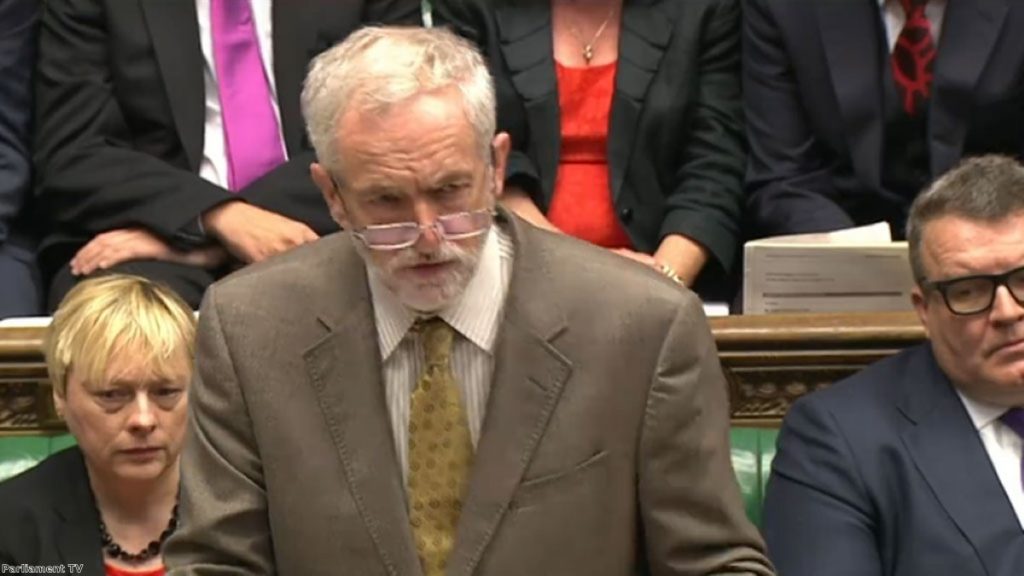Locked in cold war. Can Labour really go on like this?
From reading the recent coverage of Labour's internal problems, you might assume the party was in a state of bloody civil war, but the reality is quite different.
At last night's parliamentary Labour party meeting, only around 40 MPs and peers bothered to turn up. Many of those who did, trailed off soon after it began, while those who stayed had little to say. The hectoring and jeering of recent meetings was absent. There was a short debate about Heathrow expansion, but there was little controversy and Jeremy Corbyn didn't even turn up. The controversy over Ken Livingstone's potential appointment to the House of Lords wasn't raised once and the whole thing was over in less than an hour. If Labour is a party in civil war, it is a remarkably quiet one.
Of course most Labour MPs are still overwhelmingly opposed to Corbyn. The folded arms and looks of disdain on their faces as he stands up at prime minister's questions, accurately portray their feelings. Corbyn has little support either on the front or the backbenches. If Labour MPs ever agree with him on an issue it is largely by accident. He has no powers of persuasion or intimidation over his MPs. Even his own shadow cabinet don't think twice about disagreeing with him in public. When it comes to his MPs, he is the Labour leader in name only.
Yet there are not any even half-serious plans to move against him. The suggestion, before his election, that MPs would launch a coup against him "on day one" proved unfounded. There is nobody with any great standing in the party, who has either the motivation or the ability to stab Corbyn either in the back or in the front. If any coup were attempted it would fizzle out. If party elders quietly urged him to stand down, he would refuse. If a leadership election were called, he would win. He is not going anywhere fast.


So does that mean everything is looking up for Corbyn? Hardly. Labour's position looks bad and unlikely to improve. After the polling calamity in May, it's easy for Corbyn's supporters to dismiss the opinion polls, but there is no doubt that the public have not warmed to the Labour leader. His opinion poll ratings are terrible, both in comparison to other rival party leaders and compared to his predecessors. No previous Labour leader has had a worse start in terms of the polls and Labour's own ratings remain lodged in the 20s. Even without the upcoming boundary changes, Labour's chances of winning the next election look distant to the point of invisibility.

Jeremy Corbyn's supporters remain as enthusiastic as ever
Yet amid the blackness, the Oldham East by-election was a solitary chink of light for Corbyn supporters. Despite all the predictions of a wipeout, Labour actually improved their position on the general election, while delivering a bloody nose to Ukip. Yet even this merely served to divide the party. For Corbyn's supporters, it showed that the 'Westminster bubble' (presumably including the opinion pollsters) had failed to spot a surge in public support for Labour under Corbyn. Yet his detractors took an entirely different lesson from it. For them, the result simply showed how well the party could do when it was fronted by a 'moderate' centre ground candidate like Oldham East's new MP Jim McMahon. The by-election simply confirmed, to both sides of the Labour party, what they already believed. Nobody's mind was changed. Nobody's case was won.
The result didn't change Labour's wider prospects either. While there was no meltdown in Oldham, Labour's result was not one of a party storming to an overall majority in 2020. In fact compared to by-elections at a similar period in the last parliament, Labour's performance was actually worse than might ordinarily be expected and broadly in line with their national opinion polling. Of course it is foolish to extract too much from just one by-election, but if Labour want evidence that they will defy predictions in 2020, it isn't to be found in Oldham.
All of which leads us back to where we began: a hopelessly divided party, led by an unpopular leader, who despite that unpopularity, looks all but impossible to depose.
In recent days there has been a spate of opinion pieces from people on the centre right of the party, explaining why they are either leaving the party, or are not leaving the party, but don't want them to win if Corbyn stays as leader. It is the latter genre which most sums up the state of the Labour party at the moment: two sides locked in a bloodless conflict, one side of which doesn't seem to care about winning, the other side of which doesn't seem to want to win.
Most of the coverage of the Labour party exaggerates the conflict between these two warring parties. There is undoubtedly a real disagreement within Labour. But as things stand, that disagreement looks unlikely either to come to a head, or to resolve itself.
It's a hopeless position for a major party to be in, but as the year draws to an end, it's a situation which looks unlikely to change any time soon.









